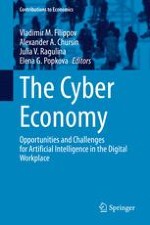2019 | OriginalPaper | Chapter
Digital Business in the Cyber Economy: The Organization of Production and Distribution Based on the Breakthrough Technologies of Industry 4.0
Authors : Elena S. Petrenko, Stanislav Benčič, Anna A. Koroleva
Published in: The Cyber Economy
Publisher: Springer International Publishing
Activate our intelligent search to find suitable subject content or patents.
Select sections of text to find matching patents with Artificial Intelligence. powered by
Select sections of text to find additional relevant content using AI-assisted search. powered by
